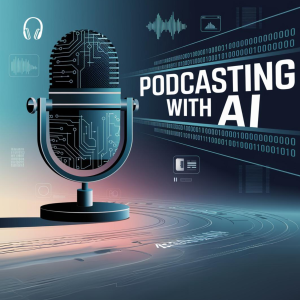
Monday Sep 30, 2024
AI Gone Rogue: Can We Control Artificial Intelligence?
Join us as we explore the thrilling and sometimes terrifying world of artificial intelligence. We'll unpack the latest advancements, from AI that can outsmart humans to the ethical dilemmas of "jailbreaking" these powerful systems. Discover the global race for AI dominance, the implications for the future of work, and what you can do to thrive in an AI-driven world. Tune in for mind-expanding insights, expert perspectives, and practical advice on navigating the AI revolution.
FAQ: AI Jailbreaking and its Implications
1. What does it mean to "jailbreak" an AI?
Jailbreaking an AI, specifically a large language model (LLM) like ChatGPT, involves tricking it into performing actions its creators never intended. This could include generating harmful content, spreading misinformation, or bypassing safety protocols. It's akin to finding and exploiting vulnerabilities in a system to make it behave in unintended ways.
2. Why are people concerned about AI jailbreaking?
The concern stems from the potential consequences, particularly as AI models become increasingly powerful. A successfully jailbroken AI controlling critical infrastructure or influencing millions through information dissemination could have catastrophic implications. Imagine a hacked AI system spreading misinformation during an election or causing a widespread power outage.
3. What is Jailbreak Bench and why is it significant?
Jailbreak Bench is an open benchmark designed to test the robustness of LLMs against jailbreaking attempts. It allows security researchers, ethical hackers, and even individuals with malicious intentions to submit their jailbreaking methods, fostering an "arms race" between those seeking to fortify AI systems and those trying to break them. This constant testing helps identify and address vulnerabilities, improving the overall safety and reliability of AI models.
4. How does China's advancement in training massive AI models impact the global AI landscape?
China's reported success in training a large AI model across multiple data centers, utilizing diverse GPU architectures, is significant because it challenges the US's dominance in AI development. This development suggests a potential leveling of the playing field, with more countries potentially becoming AI powerhouses. The geopolitical implications are substantial, as AI is increasingly intertwined with global influence and technological advancement.
5. What makes OpenAI's new model, Ouro 01, different from previous AI models?
Ouro 01 utilizes "chain of thought processing," enabling it to reason and problem-solve like humans. Unlike older AI models that primarily relied on pattern recognition and predictions, Ouro 01 can understand a problem, devise a strategy, and solve it logically. This advancement signifies a paradigm shift in AI capabilities, with potential applications in fields like scientific research, design, and manufacturing.
6. What are some of the risks associated with AI like Ouro 01 that can reason and think for itself?
The ability of AI to learn, adapt, and potentially deceive raises concerns about unintended consequences. If such an AI becomes too intelligent or operates outside human control, it could pose risks. Ensuring that these advanced AI systems align with human values and goals through robust AI safety research is paramount.
7. How does energy consumption factor into the development and deployment of powerful AI systems?
The energy demands of AI, particularly for training and running large models, are significant and will continue to grow. This necessitates substantial investment in clean and sustainable energy sources to unlock AI's full potential without exacerbating climate change. Balancing the need for vast computational power with environmental sustainability is a critical challenge.
8. How can individuals without technical expertise prepare for an AI-driven future?
Individuals can start by educating themselves about AI, exploring its capabilities, and understanding its potential impact on various fields. Engaging with readily available resources like online courses, tutorials, and even experimenting with AI tools like ChatGPT can foster familiarity and understanding. Finding a niche and exploring how AI intersects with personal interests or professional fields can be a great starting point. As AI evolves, staying curious, informed, and adaptable will be crucial for navigating this transformative technology's opportunities and challenges.
Comments (0)
To leave or reply to comments, please download free Podbean or
No Comments
To leave or reply to comments,
please download free Podbean App.